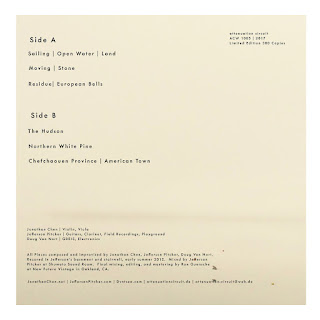Paradise Lost by Christopher Chaplin
The usual case with the label neo-classical is I get the notion that many of the albums labelled in this way get a bad rap as a epigone of some fatal mash-up of classical ambient with synth-based music that is both pompous and shallow.
"Paradise Lost" is nowhere near that trench although tagged as neo-classical. It gets straight to the point from the first minute of the scenario with disturbing electronic post-techno squelches which might be a bit of a distraction when you think of it as a big unknown.
Beautifully organised with a growing tenderness of painful release of the tension up until the climaxing of both instruments and the vocals, hides from us somewhat strange dynamics that is both epic and deep. Christopher Chaplin who studied piano in Vevey, Switzerland in early 80's, worked with Hans-Joachim Roedelius, Christine Martha Roedelius, Judith Hemla, Pino Costalunga, among many others.
He brings interesting experimental quality to chamber music with lots of electronic derivatives and modern classical composition but with emotional intensity that these genres don't necessarily possess.
"Paradise Lost" is nowhere near that trench although tagged as neo-classical. It gets straight to the point from the first minute of the scenario with disturbing electronic post-techno squelches which might be a bit of a distraction when you think of it as a big unknown.
Beautifully organised with a growing tenderness of painful release of the tension up until the climaxing of both instruments and the vocals, hides from us somewhat strange dynamics that is both epic and deep. Christopher Chaplin who studied piano in Vevey, Switzerland in early 80's, worked with Hans-Joachim Roedelius, Christine Martha Roedelius, Judith Hemla, Pino Costalunga, among many others.
He brings interesting experimental quality to chamber music with lots of electronic derivatives and modern classical composition but with emotional intensity that these genres don't necessarily possess.


Comments
Post a Comment